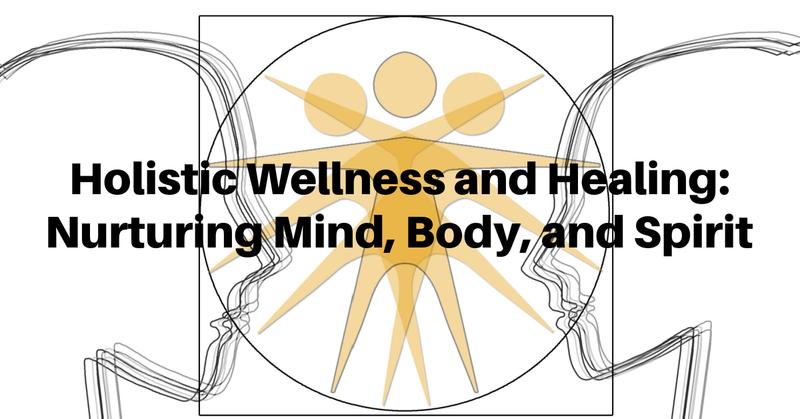Holistic Wellness and Healing: Nurturing Mind, Body, and Spirit
Holistic Wellness and Healing: Nurturing Mind, Body, and Spirit
In a world that is constantly moving at an unprecedented pace, the concept of holistic wellness and healing has gained significant traction. Holistic wellness is a philosophy that focuses on achieving overall well-being by addressing the interconnectedness of the mind, body, and spirit. It recognizes that these facets of human existence are deeply intertwined, and true wellness can only be attained when all aspects are in harmony. This approach to health goes beyond mere absence of disease, emphasizing the importance of proactive care, prevention, and a balanced lifestyle.
The Essence of Holistic Wellness: Mind, Body, and Spirit
Holistic wellness is built on the belief that health isn't solely about physical fitness, but encompasses mental, emotional, and spiritual health as well. It recognizes that when one aspect of our being is suffering, it can have a cascading effect on the others. For instance, chronic stress can lead to physical ailments, just as emotional turmoil can impact mental clarity. Therefore, nurturing each aspect is essential for overall wellness.
Physical Well-being: The Foundation of Holistic Wellness
Physical health is often the most tangible aspect of wellness, as it's easily observable. Regular exercise, a balanced diet, sufficient sleep, and proper hydration form the cornerstone of physical well-being. However, holistic wellness goes beyond these basics, encouraging people to listen to their bodies and address any discomfort or imbalances. It emphasizes practices like yoga, tai chi, and meditation, which not only enhance physical health but also promote mental and emotional well-being.
Mental and Emotional Well-being: Cultivating Inner Harmony
A calm mind and emotional resilience are integral to holistic wellness. Techniques such as mindfulness, meditation, and deep breathing help individuals manage stress, anxiety, and negative thought patterns. Holistic wellness encourages the exploration of one's emotions, seeking professional help if needed, and learning healthy coping mechanisms. By tending to mental and emotional health, individuals can enhance their overall quality of life and build healthier relationships.
Spiritual Nourishment: Connecting to a Higher Purpose
Spirituality doesn't necessarily denote religious affiliation. It refers to a sense of connection to something greater than oneself, whether it's nature, the universe, or a higher power. Engaging in activities that foster spiritual growth, such as spending time in nature, practicing gratitude, or engaging in creative endeavors, can contribute to a deep sense of purpose and contentment. This dimension of holistic wellness reminds us of the importance of finding meaning beyond the material world.
The Role of Holistic Healing Practices
Holistic healing practices encompass a wide range of approaches that support the mind-body-spirit connection. Some popular holistic therapies include:
Acupuncture: This traditional Chinese medicine practice involves inserting thin needles into specific points on the body to stimulate energy flow and restore balance.
Ayurveda: Originating in India, Ayurveda emphasizes balance through individualized diet, herbal remedies, and lifestyle practices.
Herbal Medicine: The use of plants and natural substances to promote healing and well-being, often based on traditional knowledge.
Energy Healing: Practices like Reiki and Qi Gong focus on balancing and harmonizing the body's energy fields to promote healing.
Holistic Nutrition: A personalized approach to diet that takes into consideration an individual's specific needs and aims to nourish the body from within.
Art and Music Therapy: Creative expressions like art and music can be therapeutic tools for emotional healing and self-discovery.
Mind-Body Therapies: Practices like chiropractic care, osteopathy, and massage therapy aim to align physical structures with mental and emotional states.
Embracing Holistic Wellness in Everyday Life
Incorporating holistic wellness into daily life doesn't require a complete overhaul; it's about making intentional choices that promote balance and vitality. Here are some steps you can take:
Practice Self-Care: Dedicate time each day to activities that bring you joy and relaxation, whether it's reading, taking a leisurely walk, or indulging in a hobby.
Prioritize Sleep: Ensure you're getting enough restorative sleep to support physical and mental rejuvenation.
Nourish Your Body: Opt for whole, nutrient-rich foods that provide the energy and nutrients your body needs to thrive.
Stay Active: Engage in regular physical activity that you enjoy, whether it's a workout, dance, or a sport.
Cultivate Mindfulness: Incorporate mindfulness practices into your routine, such as meditation or deep breathing, to manage stress and enhance awareness.
Connect Socially: Foster meaningful relationships that provide emotional support and connection.
Explore Your Spirituality: Engage in practices that resonate with your sense of spirituality, whether it's through meditation, prayer, or spending time in nature.
The Holistic Wellness Journey
Holistic wellness is a lifelong journey that requires ongoing self-discovery and mindful choices. It's about recognizing that well-being encompasses far more than physical health alone. By nurturing the mind, body, and spirit, individuals can experience a profound sense of balance, vitality, and fulfillment. As the world continues to evolve, the wisdom of holistic healing and wellness reminds us of the importance of tending to all aspects of our being for a truly harmonious and enriched life.
Be the first to post a message!
